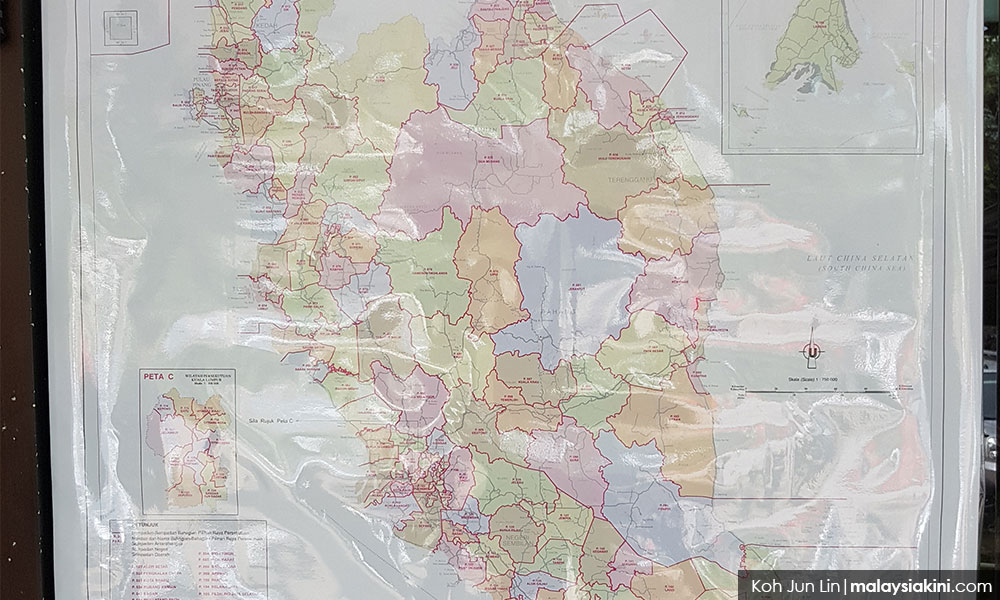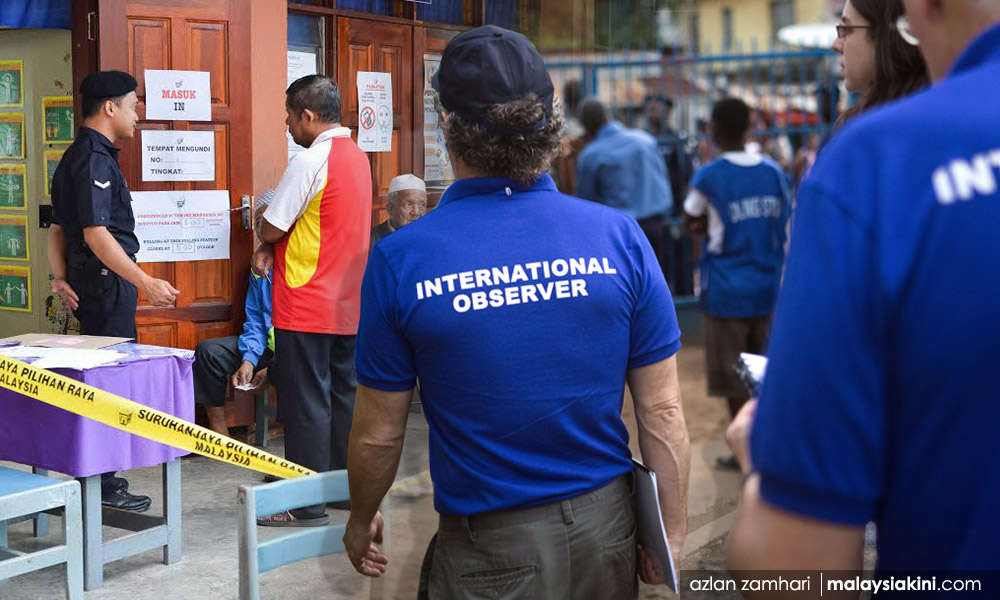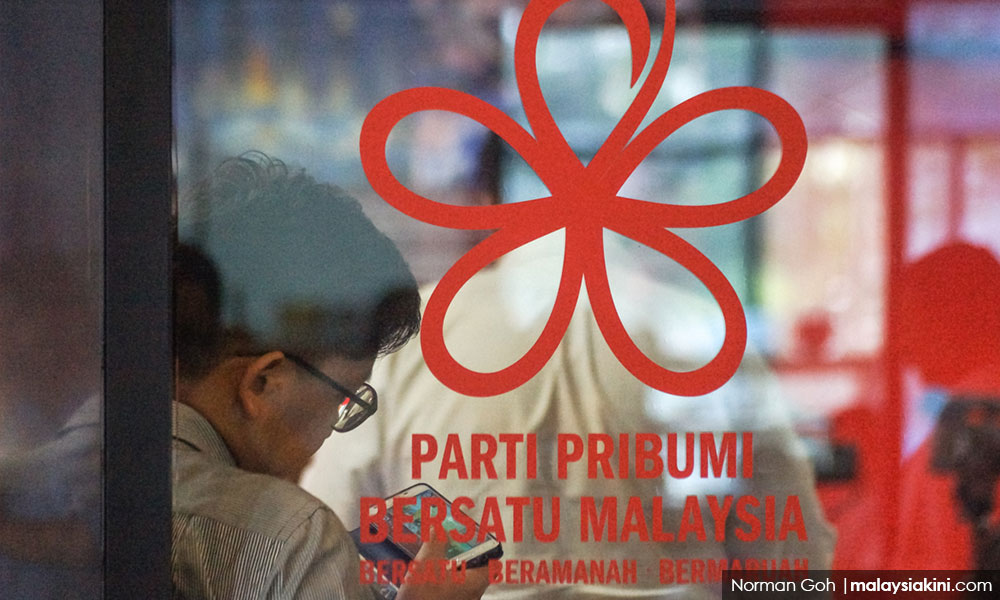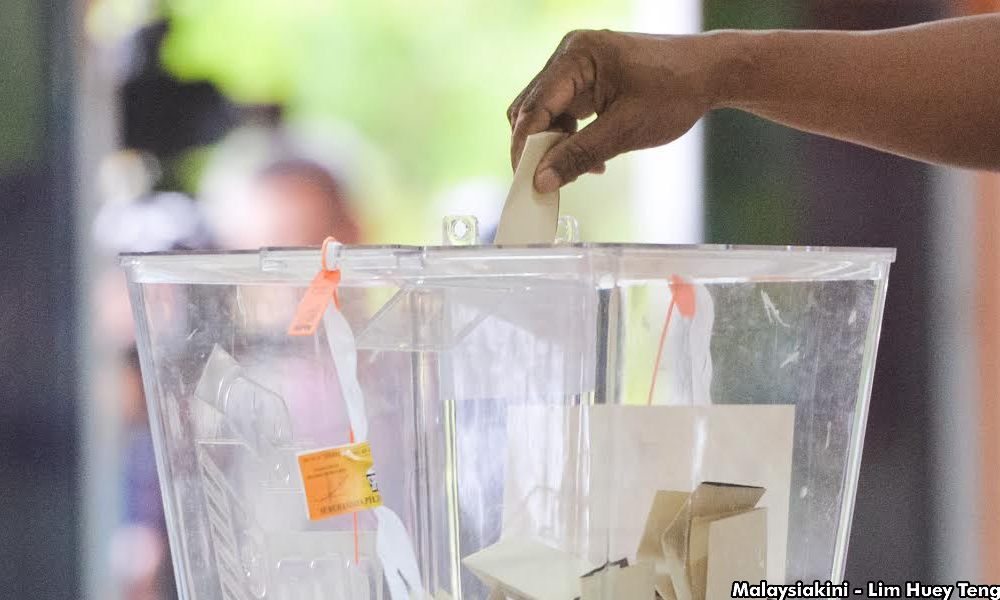COMMENT | A couple of weeks away from GE14, Malaysians are finally coming to terms with the lengths the BN government will go to ensure that they come out on top once again.
Sensing a renewed Pakatan Harapan (Harapan) coalition challenge under the leadership of Dr Mahathir Mohamad, caretaker prime minister Najib Abdul Razak and the Election Commission (EC) are attempting to seal BN’s victory even before voters reach the ballot boxes.
In case you missed the dirty tricks that the incumbent government has utilised, here are the most important points, and why they matter:
1) Gerrymandering and malapportionment by the EC
The 13th general election saw a record turnout of 12 million voters, or nearly 85 percent of all registered voters in Malaysia. However, despite winning the popular vote (50.87 percent), gerrymandering and malapportionment meant that (the now defunct) Pakatan Rakyat only won 89 parliamentary seats to BN’s 133 parliamentary seats.
Five years on from 2013, the EC, prime minister, and BN MPs have railroaded a monster of a redelineation proposal through Parliament which undermines the opposition and benefits BN. Bluntly put, this latest proposal is gerrymandering and malapportionment on steroids.
Despite the EC’s obligation under the Thirteenth Schedule of the Federal Constitution to ensure that the number of voters in constituencies are “approximately equal”, they have done the opposite blatantly.
Research published has indicated that the latest electorate size for the 133 parliamentary constituencies won by BN in GE13, have an average of 48,228 voters. In stark contrast, those won by Pakatan Rakyat have over 30,000 more voters: the average is 79,436. Opposition voters are being packed into already-large constituencies which make a mockery of the ‘one person, one vote’
principle.
Meanwhile, BN reaps the benefits of multiple markedly smaller constituencies with far fewer voters.

Why does this matter? In short, by removing opposition voters from marginal constituencies (such as P137 Bukit Katil) and putting them in opposition strongholds (P138 Kota Melaka), BN can wrest back
control of some seats by weakening the opposition vote there – and all this without even lifting a finger to campaign or sway voters.
In fact, in the most extreme example available, it is possible for BN to return to power with a simple majority in Parliament by winning the smallest 112 constituencies (which contain 33 percent of the
electorate) with only 16.5 percent of the popular vote.
This is merely one of the more insidious ways in which the EC has conspired to turn the election heavily in favour of BN. Multiple objections submitted by members of the public to the EC regarding
the redelineation report were ignored completely. Most importantly, all ongoing cases in the courts challenging the redelineation process have been bulldozed through and defeated as well.
2) Unreliable election observers
As if gerrymandering and malapportionment were not enough, the EC has decided to bask in its glory for a job well done by inviting representatives from several other countries to observe GE14.
Ordinarily, this would be cause for celebration – credible election observers serve only to verify that the election has been carried out in accordance with international standards and to accord legitimacy to the results. The guest list for GE14, however, is nothing short of laughable.
Of the seven countries that have confirmed their attendance – Indonesia, Thailand, the Maldives, Timor Leste, Cambodia, Kyrgyzstan, and Azerbaijan, only Indonesia is remotely a democratic country while Timor Leste is a young country, achieving independence only in 2002.

Thailand has been under military rule since 2014; Cambodia is an openly authoritarian one-party state; the Maldives was in a state of emergency in February 2018 and security forces stormed the Supreme Court in order to force it to change a verdict that favoured the opposition; Kyrgyzstan and Azerbaijan have been
slammed as “consolidated authoritarian regimes” by Freedom House – what sort of credibility can these states possibly offer for the Malaysian election?
Unsurprisingly, reputable election observers such as the European Union, the Carter Center, or the Asian Network for Free and Fair Elections (Anfrel) were not invited while questionable NGOs and
representatives from local universities with no track record of election observing were instead.
As a bonus, a shadowy organisation known as the Malaysian Commonwealth Studies Centre (MCSC), supposedly located in Cambridge in the United Kingdom, was nominated to provide “research and support”. A cursory Google search of MCSC leaves one with more questions than answers – there is no trace of their work online, and publicly-available information about the organisation is virtually non-existent.
3) The Registrar of Societies temporarily dissolving Bersatu
Two days before the dissolution of Parliament, the Registrar of Societies (ROS) temporarily dissolved Bersatu, declaring that it had failed to submit the relevant documents and information required under the Societies Act 1966.

In this regard, the BN government has resorted to tried-and-true methods of hobbling the opposition in every way possible. The ROS, under the ambit of the Home Ministry, has long acted selectively for the ruling government as it conveniently ignored Umno’s own non-compliance to its constitution by failing to hold party elections in the last five years.
It is also no coincidence that with the temporary dissolution of Bersatu, Harapan's application to register as a coalition has been thrown into disarray.
However, this setback has only served to strengthen Harapan, as they have resolved to contest under one symbol - that of PKR - which will be a huge boost for the opposition.
4) Hosting GE14 on a Wednesday
Perhaps the most obvious clue yet that BN is fighting tooth and nail to suppress the opposition vote has been the bombshell announcement that GE14 will take place on a Wednesday, in the middle of the working week. This marks the first time in nearly 20 years that the vote has fallen on a weekday, and it is the first time since 1959 that Malaysians have voted on a Wednesday.

There is a consensus that a lower voter turnout will benefit BN. Indeed, previous elections in 1995 and 1999 that took place on Monday or Tuesday saw voter turnout at 68.3 percent in the former, and 69.3 percent in the latter. In stark contrast, elections held on weekends saw turnouts of at least 72 percent or higher.
This tactic is designed to inconvenience Harapan voters as much as possible as most opposition supporters are living in the cities and those who have not changed their voting station will require time to travel back to their hometowns to cast their votes.
A vote in the middle of the week (even Monday or Friday would have been far less disruptive than Wednesday) is a massive inconvenience for those working in the city, or who have children to send to school and cannot afford to be gone for any longer than a day.
Some are returning to as far as Sabah and Sarawak to vote or travelling home from Singapore. It is extremely unfortunate that as a result of BN’s desperation to win the election by any means
necessary, voters and employers will have to bear the consequences of work and travel plans upended.
What now?
The four points outlined above are a small window into what we can continue to expect for at the very least the next five years should BN win GE14. They will continue to chip away at what little is left of our democracy, passing ridiculous laws such as the Anti-Fake News Act 2018, gerrymandering constituencies to ensure their continued reign, and persecuting opposition figures and activists on the flimsiest of pretexts.
The stakes in this election are real. The odds have clearly been stacked against the opposition from the get-go, and what was already an uphill battle has now become that much harder. Hope,
however, is not lost. Despite all that has transpired, not even the deftest of gerrymandering procedures can subvert the will of the overwhelming majority of the electorate.
The BN government’s desperation is clear to see.Their hold on power has been slipping ever since 2008, and they have everything to lose going into GE14. Rife with corruption and cronyism after 60
years in power, BN is rightfully terrified of the reckoning they will receive if they were to lose power.
To overcome the odds, there is only one avenue left to us: we must vote, and vote in droves and overwhelmingly. Volunteer, donate, share information with your friends and family – but most importantly, vote. Change is still possible, but only if we decide that it matters enough for us to show up and demand it.
That BN conspired to steal this election from under our noses should go down in infamy, and it is all the more reason that all of us should be angry enough to oust them come May 9. We cannot let
this den of crooks run this country into the ground for a minute longer. The future of our country depends on your vote.
ERIC PAULSEN is executive director of Lawyers for Liberty.
The views expressed here are those of the author/contributor and do not necessarily represent the views of Malaysiakini.

